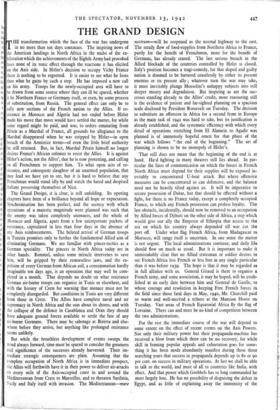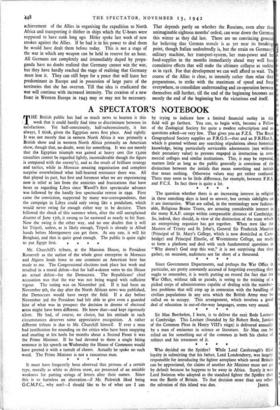THE GRAND DESIGN
HE transformation which the face of the war has undergone in no more than ten days continues.. The inspiring news of the American landings in North Africa in the midst of the ex- hilaration which the achievements of the Eighth Army had provoked loses none of its tonic effect through the reactions it has elicited on the Axis side. In Hitler's decision to occupy Vichy France there is nothing to be regretted. It is easier to see what he loses than whit he gains by such a step. He has imposed a new call on his army. Troops for the newly-occupied area will have to be drawn from some source where they can ill be spared, whether it be Northern France or Germany itself, or even, by some process of substitution, from Russia. The general effect can only be to rally new sections of the French nation to the Allies. If re- sistance in Morocco and Algeria had not ended before Hitler made his move that move would have settled the matter, for while some regard might be paid, and was, to orders emanating from Petain as a Marshal of France, all grounds for allegiance to the Marshal disappeared when he was stripped by Hitler—in open breach of the Armistice terms—of even the little brief authority he still retained. But, in fact, Marshal Petain himself no longer desires France's African colonies to resist the Allies. It is against Hitler's action, not the Allies', that he is now protesting, and calling on all Frenchmen to support him. To what open acts of re- sistance, and consequent slaughter of an unarmed population, that may lead we have yet to see, but it is hard to believe that any Frenchman would stand idly by and watch the hated and despised Italians possessing themselves of .Nice.
The Grand Design, it is clear, is still unfolding. Its opening chapters have been of a brilliance beyond all hope or expectation. Synchronisation has been perfect, and the secrecy with which operations of a majestic magnitude were planned was such that the enemy was taken completely unawares, and the whole of Morocco and Algeria, apart from a few unimportant pockets of resistance, capitulated in less than four days in the absence of any Axis reinforcements. The belated arrival of German troops in Tunisia promises only to further the fundamental Allied aim of eliminatin& Germans. We are familiar with pincer-tactics as a German speciality. The pincers in North Africa today are in other hands. Rommel, unless some miracle intervenes to save him, will be gripped by their remorseless jaws, and the ex- pulsion of every German from African soil; a consummation hardly imaginable ten days ago, is an operation that may well be com- pleted in a month. That depends no doubt on what resistance German air-borne troops can organise in Tunis or elsewhere, and with the history of Crete for warning that menace must not be completely disregarded. But conditions in Tunis are very different from those in Crete. The Allies have complete naval and air supremacy in North Africa and the seas about its shores, and with the collapse of the defence in Casablanca and Oran they should have adequate ground forces available to settle the fate of any air-borne Germans. There may be sabotage at Bizerta and else- where before they arrive, but anything like prolonged resistance seems unlikely.
But while the breathless development of events sweeps the mind always forward, time must be spared to consider the greatness and significance of the successes already harvested. Their im- mediate strategic consequences are plain. Assuming that the complete occupation of North Africa is in immediate prospect, the Allies will forthwith have it in their power to deliver air-attacks on every mile of the Axis-occupied coast in and around the Mediterranean from Crete to Marseilles, and to threaten Sardinia, Sicily and Italy itself with invasion. The Mediterranean—mare nostrum—will be reopened as the normal highway to the east. The steady flow of food-supplies from Northern Africa to France, partly for the benefit of Frenchmen, more for the benefit of Germans, has already ceased. The last serious breach in the Allied blockade of the countries controlled by Hitler is closed. Italy's position becomes a tragi-comedy, for that duped and guilty nation is doomed to be battered ceaselessly by either its present enemies or its present ally ; whatever turn the war may take, it must inevitably plunge Mussolini's unhappy subjects into still deeper misery and degradation. But inspiring as are the suc- cesses standing already to the Allies' credit, more reassuring still is the evidence of patient and far-sighted planning on a spacious scale disclosed by President Roosevelt on Tuesday. The decision to substitute an offensive in Africa for a second front in Europe as the main task of 1942 was hard to take, but its justification is already established, and the systematic efficiency with which every detail of operations stretching from El Alamein to Agadir was planned is of immensely hopeful omen for that phase of the war which follows " the end of the beginning." The art of planning is shown to be no monopoly of Hitler's.
That still does not mean that the beginning of the end is at hand. Hard fighting in many theatres still lies ahead. In par- ticular the lines of communication on which the forces in French North Africa must depend for their supplies will be exposed in- evitably to concentrated U-boat attack. But where offensive measures can be concentrated so can defensive, and the balance need not be heavily tilted against us. It will be imperative to secure possession of Dakar, but that should be effected without a fight, for there is no France today, except a completely occupied France, to which any French possession can profess loyalty. The last obstacle, incidentally, should now be removed to an occupation by Allied forces of Djibuti on the other side of Africa, a step which would give our ally the Emperor of Ethiopia that access to the sea on which his country always depended till war cut the port off. Under what flag French Africa, from Madagascar to Morocco, will range itself is uncertain. In one sense the matter is not urgent. The local administrations continue, and daily life should flow on much as usual. But it is important to make it unmistakably clear that no Allied statesman or soldier desires to see French Africa less French or less free in any single particular than it was before 1939. The hope is that it may be regarded as in full alliance with us. General Giraud is there to organise a French army, and some association, it may be hoped, will be estab- lished at an early date between him and General de Gaulle, to whose courage and resolution in keeping Free French forces in the field since those fatal days in May, 1940, Mr. Churchill paid so warm and well-merited a tribute at the Mansion House on Tuesday. Vast areas of French Equatorial Africa fly the flag of Lorraine. There can and must be no kind of competition between the two administrations.
For the rest the immediate course of the war will depend to some extent on the effect of recent events on the Axis Powers. Not only their military power but their propaganda-machine has received a blow from which there can be no recovery, for while skill in framing popular appeals and exhortation goes for some- thing it has been made abundantly manifest during these three searching years that success in propaganda depends up to 8o or 90 per cent. on success in military' operations. At last we shall be able to talk to the world, and most of all to countries like India, with effect. And that power which Goebbels has so long commanded he must largely lose. He has no possibility of disguising the defeat in Egypt, and as little of explaining away the immensity of the achievement of the Allies in organising the expedition to North Africa and transporting it thither in ships which the U-boats were supposed to have sunk long ago. Hitler spoke last week of new strokes against the Allies. If he had it in his power to deal them he would have dealt them before today. This is not a stage of the war in which any weapon can be held in reserve for an hour. All Germans not completely and irremediably duped by propa- ganda have no doubt realised that Germany cannot win the war, but they have hardly reached the stage of realising that Germany must lose it. They can still hope for a peace that will leave her predominant in Europe and in possession of large parts of the territories that she has overrun. Till that idea is eradicated the war will continue with increased intensity. The creation of a new front in Western Europe in 1943 may or may not be necessary. That depends partly on whether the Russians, even after the unimaginable eighteen months' ordeal, can wear down the Germans this winter as they did last. There are no convincing groun for believing that German morale is as yet near its breaking point, though Italian undoubtedly is, but the strain on Germany's military machine, her transport-system, her man-power and her food-supplies in the months immediately ahead may well have cumulative effects that will make the ultimate collapse as sudden as in 1918. For that development we can well afford to wait. The course of the Allies is clear, to intensify rather than relax their preparations, to strike with the maximum of speed and force everywhere, to consolidate understanding and co-operation between themselves still further, till the end of the beginning becomes not merely the end of the beginning but the victorious end itself.



























 Previous page
Previous page